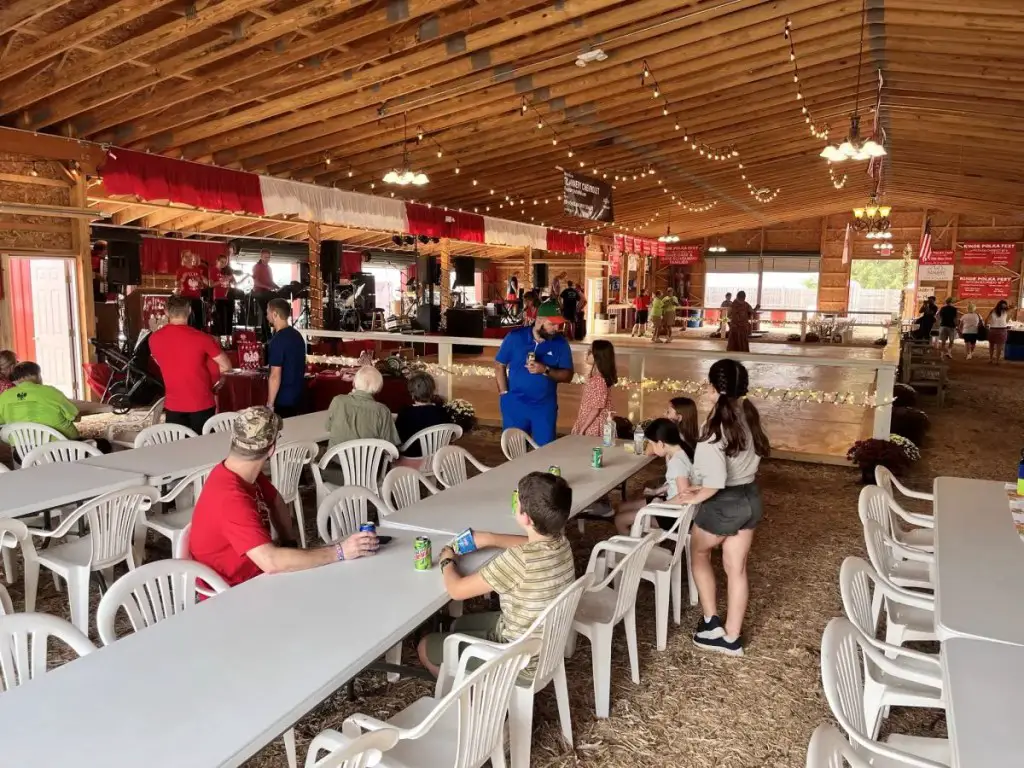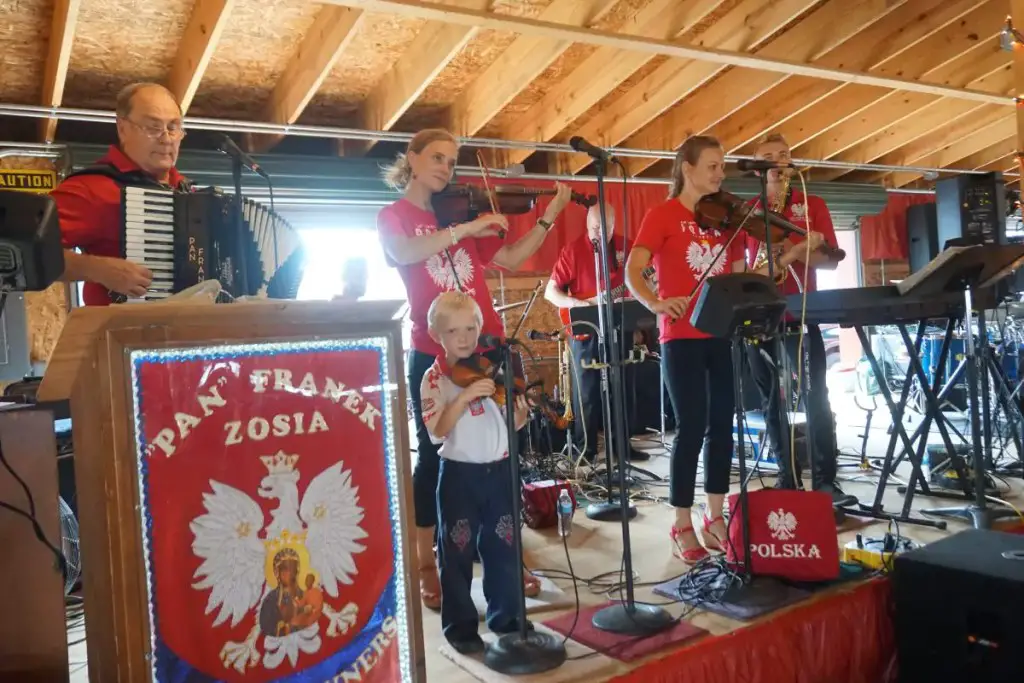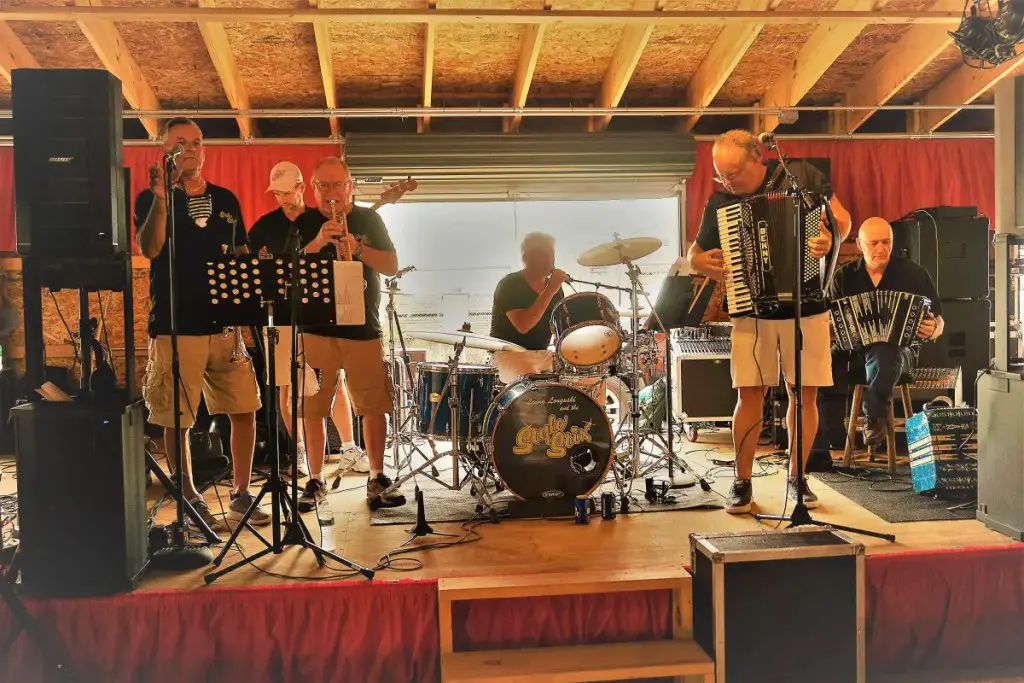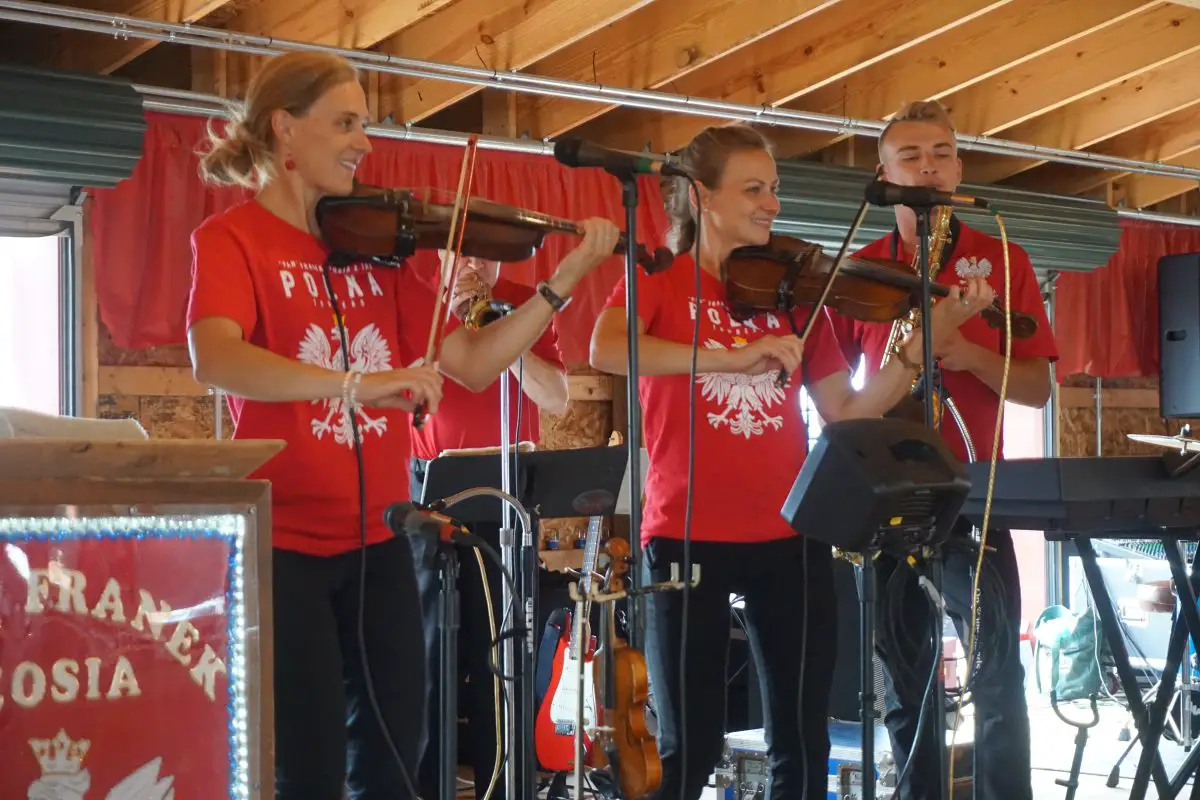The post-Labor Day celebrations with the Kinde Polka Fest come roaring back to the Upper Thumb with over 60 volunteers and a full slate of Polka entertainment over two days at the Friends of Kinde Palace. Kinde Polka Festival organizers are optimistic that attendance will return to the pre-COVID levels of past years.
Festivities kick off this morning (Saturday, Sept. 14th) with the 5K run at 9 am. The Kinde Polka Fest 5k run-walk will raise money for athletic scholarships.
The musicians who perform at the festival come from both within and outside the state, with some coming from as far away as New York, as close as Chicago, and as far away as Pennsylvania. The festival’s master of ceremonies is Polka Paul. The show begins at 2 p.m. on Saturday and at Noon on Sunday. Adults 21 and over pay $15 to enter. Those 16-20 pay $10, and 15 and under are free.
Kinde Polka Fest Band Rotation

All these acts will be performed in the Friends of Kinde Palace, which was constructed in 2017 specifically for this event. This old-time dance hall offers plenty of room for attendees to dance and enjoy the tunes. Here is the band rotation for the Festival
Here’s a detailed section about the lineup of polka bands for the 2024 Kinde Polka Fest, along with a table summarizing the schedule:
2024 Kinde Polka Fest Band Lineup
The 2024 Kinde Polka Fest promises to be an unforgettable celebration of polka music, featuring some of the most talented and energetic polka bands from across the region. With a lineup that includes both seasoned performers and crowd favorites, the festival offers a diverse range of polka styles and rhythms to keep everyone dancing throughout the weekend. Whether you’re a longtime polka enthusiast or new to the genre, these bands will provide an authentic and lively polka experience.
Here’s a closer look at the bands performing at this year’s festival:
John Stevens’ Doubleshot
Renowned for their dynamic performances and engaging stage presence, John Stevens’ Doubleshot has become a staple in the polka community. They bring a modern twist to traditional polka, making their performances a hit with audiences of all ages.
Pan Franek, Zosia and the Polka Towners

“Pan” Franek, the band’s frontman and father, founded the Polkatowners in 1974. Since then, he and his lovely wife Zosia have raised five musically gifted children and grandkids dedicated to sharing Polish culture and good-sounding Polish polka music!
Known for their vibrant and energetic shows, Pan Franek, Zosia, and the Polka Towners offer a blend of traditional and contemporary polka music. Their lively tunes and charismatic performances make them a crowd favorite.
Polka Generation
Polka Generation brings a fresh perspective to the polka scene with their innovative arrangements and infectious energy. Their performances are a celebration of polka’s rich heritage, infused with a modern flair.
Darrell Weltin and the New Brass Express
A powerhouse in the polka world, Darrell Weltin and the New Brass Express deliver a bold and brassy sound that is sure to get everyone on their feet. Their high-energy performances are a highlight of any polka festival.
The new Brass Express consists of Darrell Weltin – accordion, concertina, keyboard – (leader), Tommy Reder – clarinet, sax, John Rzyhak – trumpet, clarinet, vocals, Larry Chonowski – trumpet, Mark Durocher – bass, Paul Romanowski – drums, vocals. Each member of the ensemble has over 20 years of polka experience. They are proficient in the ‘traditional’ style of Polish polkas. The band recently finished recording at Peppermint Studios.
Steve Drzewicki Band
The Steve Drzewicki Band, performing for almost 30 years, was inducted into the Michigan State Polka Hall of Fame in 2019. You can stream Steve Drzewicki Band on Amazon for free
With a deep-rooted passion for polka music, the Steve Drzewicki Band offers a blend of traditional and original compositions. Their polished sound and dedication to the genre make them a must-see act at the festival.
Style Stix

Style Stix brings a unique flavor to the festival with their eclectic mix of polka and other dance music styles. Their versatility and engaging performances are sure to add a dynamic element to the festival lineup.
Band Performance Schedule
Below is the performance schedule for the 2024 Kinde Polka Fest:
| Day | Time | Band |
|---|---|---|
| Saturday | 2:00 to 2:50 PM | John Stevens’ Doubleshot |
| 2:50 to 3:40 PM | Pan Franek, Zosia and the Polka Towners | |
| 3:40 to 4:30 PM | Polka Generation | |
| 4:30 to 5:20 PM | Darrell Weltin and the New Brass Express | |
| 5:20 to 6:10 PM | John Stevens’ Doubleshot | |
| 6:10 to 7:00 PM | Pan Franek, Zosia and the Polka Towners | |
| 7:00 to 7:50 PM | Polka Generation | |
| 7:50 to 8:40 PM | Darrell Weltin and the New Brass Express | |
| 8:40 to 9:30 PM | John Stevens’ Doubleshot | |
| 9:30 to 10:20 PM | Pan Franek, Zosia and the Polka Towners | |
| 10:20 to 11:10 PM | Polka Generation | |
| 11:10 PM to Midnight | Darrell Weltin and the New Brass Express | |
| Sunday | Noon to 1:00 PM | Steve Drzewicki Band |
| 1:00 to 2:00 PM | Style Stix | |
| 2:00 to 3:00 PM | Darrell Weltin and the New Brass Express | |
| 3:00 to 4:00 PM | Steve Drzewicki Band | |
| 4:00 to 5:00 PM | Style Stix | |
| 5:00 to 6:00 PM | Darrell Weltin and the New Brass Express |
This lineup is packed with polka talent, ensuring non-stop music and dancing throughout the festival. Whether you catch a performance on Saturday or Sunday, you’re guaranteed to experience the best that polka music has to offer. Don’t miss out on this chance to enjoy the lively tunes and festive atmosphere at the Kinde Polka Fest!
Sunday at the Kinde Polka Fest
Sunday, Sept. 15, begins with a breakfast/ brunch benefiting North Huron School’s National Honor Society and student council. St. Mary of Czestochowa will host a Polka Mass beginning at 10 a.m.
Fun Fact – What is Polka Music?
People have been enjoying the energetic and lively sounds of polka music for centuries. The music found at this year’s Polka Fest is no exception. However, the origins of this beloved style are somewhat disputed. Here are some of the claims across Eastern Europe.
Austria
The most likely place to find polka music is in Austria. It is a form of folk music that originated in the 19th century. It has since become a beloved staple of contemporary Austrian culture and a popular genre throughout Europe and North America.
Polka music is characterized by its fast tempo and upbeat sound. It’s best known for being played at dances—and it’s one of the earliest forms of dance music, dating back over 200 years!
Bohemia
Bohemia is a region in the Czech Republic that’s home to what we know as polka music. The roots of polka music can be traced back to 19th century Bohemia when it started being played at social gatherings across Europe by Czech Roma (gypsies). They were known as “bohémiens” or “bohémiens de l’est.” Their folk songs spread throughout Europe
Poland
If you’re a fan of polka, then you’ll be happy to know that Poland is the birthplace of this style. If you travel there today, you’ll find many different types of polka music and dance! Poland has a rich history of polka music.
Germany
The polka originated in Bohemia, a part of the former Czech Republic. The word “polka” comes from the Czech word “půl,” which means half—a reference to its two beats per measure. The dance became popular in Germany and Austria during the early 1800s, and by 1844 it was being played at balls and dances across Europe.
Serbia
In Serbia, polka music is prevalent. The Serbian folk dance known as the kolo (pronounced “ko-lo”) is performed in traditional Serbian folk music. It is a circle dance that involves groups of people—usually men and women—moving in a counterclockwise direction around the floor.
Several countries in Eastern Europe claim to be the birthplace of polka music.
Polka is a dance that originated in the mid-19th century in Central Europe, where it’s still very popular today. Polkas are known for their fast tempo and lively beat, which makes them perfect for dancing.
Polka music also accompanies many social gatherings like weddings and festivals. It’s often played at these events in countries such as Poland and Czechoslovakia (now the Czech Republic). These countries claim to be the birthplace of polka music—and they’re likely right!



